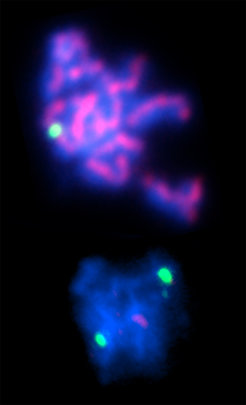
Press Page Wolfgang Zachariae
The Art of Reduction
Most of the cells in our body contain two copies of every chromosome – one from the father and one from the mother. By contrast, egg and sperm cells carry only one copy of each chromosome so that the normal, diploid set of chromosomes is restored upon fertilization. Egg and sperm are generated in a special type of cell division, called meiosis, during which the number of chromosomes is halved. Wolfgang Zachariae and his Research Group “Chromosome Biology” aim to decipher this process in detail.

The picture shows surface-spread chromosomes from yeast stained for DNA (blue), Cohesin (red), and a single locus (green) on one of the 16 chromosomes. Top: normal cell in which Cohesin decorates the chromosomes pairs along their entire length. Bottom: mutant cell in which Cohesin has been destroyed prematurely, causing precocious chromosome separation.
During early stages of meiosis, maternal and paternal chromosomes form pairs in which the chromosomes are linked by a molecular glue, called Cohesin. This glue is subsequently destroyed in a precisely regulated manner to initiate the separation of chromosomes during each of the two divisions of meiosis. Cohesin is destroyed by a proteolytic enzyme, known as Separase, which works as a molecular knife to cut the chromosome pairs apart. The researchers investigate how Cohesin is protected from Separase in early meiosis and how it is subsequently marked for cleavage at exactly the right time and place.
They use baker’s yeast for their studies because in this simple organism, the key processes of meiosis occur in a similar manner as in humans but can be investigated with a variety of methods including genetics, video-microscopy, biochemistry and even computational simulation of biochemical reactions. This research has medical relevance because errors in meiotic chromosome segregation are the leading cause of infertility, miscarriage and chromosome aberrations, most notably trisomy 21 (Down’s syndrome).


